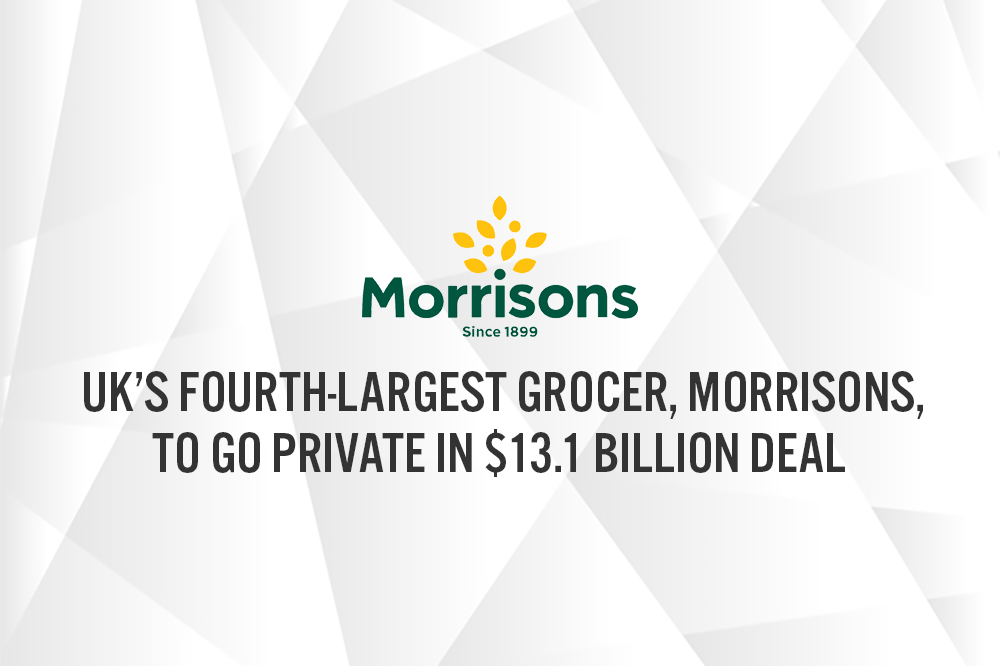
albert Chan
What’s the Story?
On July 3, 2021, the UK’s fourth-largest supermarket operator, Morrisons, reported that it has accepted a £9.5 billion ($13.1 billion) takeover offer by a consortium led by Softbank-owned Fortress Investment Group, in a move that will lead to the grocery chain being delisted from the stock market.
Why it Matters
Morrisons is the smallest of the UK’s “Big Four” supermarket chains, operating fewer than 500 stores. Nevertheless, Morrisons’ fresh-food manufacturing capability in its vertically integrated supply chain provides a key point of differentiation from its competitors.
Morrisons has performed well amid the pandemic, registering an 8.6% increase in comparable store sales (excluding fuel) for its fiscal year ended January 31, 2021. The company also expanded its online capacity fivefold during the period, posting growth across all of its digital shopping channels—Amazon, doorstep delivery, Deliveroo, food boxes and Morrisons.com.
According to Kantar World Panel, Morrisons had a 10.1% share of the British grocery market in the 12 weeks ended June 13, 2021, compared to Tesco’s 27.1%, Sainsbury’s 15.2% and Asda’s 14.1%. Other significant players such as Aldi (8.2% share), Co-op (6.3%), Lidl (6.1%), Waitrose (5.0%) and Iceland (2.3%) are privately owned.
If the bid succeeds, it would reportedly be the biggest private equity deal in the UK since the £11 billion ($15.2 billion) takeover of pharmacy chain Alliance Boots in 2007. The deal also underlines the growing appetite from private equity players for British supermarket chains, which are seen as attractive investments because of their cash generation and freehold assets. In February 2021, Walmart completed the sale of a majority stake in the UK’s third-biggest supermarket chain, Asda, for an enterprise value of £6.8 billion ($8.8 billion) to the Issa brothers, founders of retailer EG Group and private equity firm TDR Capital.
The deal will see just two major UK grocery retailers remaining as public companies: market-leader Tesco and second-place Sainsbury’s.
In the year ended January 31, 2021, Morrisons reported profit before tax and exceptionals of £201 million ($278 million; down 50.7% year over year due in part to Covid-19 costs) on total revenue of £17.6 billion ($24.3 billion).
UK’s Fourth-Largest Grocer, Morrisons, To Go Private: In Detail
Morrisons has announced that it had agreed to a takeover by a group of buyers led by New York-based private equity firm Fortress Investment Group, an independently operated subsidiary of Japan’s Softbank Group. Fortress has teamed up with Canada Pension Plan Investment Group and Koch Real Estate investments to pay £2.52 ($3.49) pence per share and a £0.02 ($0.03) dividend to buy Morrisons—valuing the company’s equity at £6.3 billion ($8.7 billion) and equating to an enterprise value of £9.5 billion ($13.1 billion) including £3.2 billion ($4.4 billion) of net debt.
The bid price is 5% above the £2.40 ($3.32) share price at close on July 2 and exceeds a £5.5 billion ($7.6 billion) bid from private equity firm Clayton, Dubilier & Rice, which Morrisons rejected on June 19, 2021, saying the price “significantly undervalued” the business.
Morrisons Chairman Andrew Higginson stated:
It’s clear to us that Fortress has a full understanding and appreciation of the fundamental character of Morrisons. This, together with the very clear intentions they have set out today, has given the Morrisons Directors confidence that Fortress will support and accelerate our plans to develop and strengthen Morrisons further.
As part of the deal, Fortress will retain Morrisons’ head office in Bradford, England, as well as its current management team led by CEO David Potts, and the firm will honor the recent pay increases at Morrisons.
What We Think
Private equity’s poor reputation in UK retail has only been compounded amid the pandemic, with high debt levels and asset-stripping measures such as sale-and-leaseback from private equity ownership having contributed to the recent downfall of major department store chain Debenhams.
Among the UK supermarkets, Morrisons is uniquely vertically integrated with 19 manufacturing sites and claimed in 2020 to be the UK’s second-biggest manufacturer of fresh food. Morrisons owns 85% of its stores and has 19 freehold manufacturing sites, which implies substantial opportunities for the sale of assets. However, apparently anticipating such concerns, all parties have attempted to downplay this possibility. Fortress stated that it “does not anticipate engaging in any material store sale-and-leaseback transactions” and pointed to it ownership of Majestic Wine, which has not sold any of its freehold or long leasehold properties under Fortress’ ownership; in fact, the acquisition of Majestic Wine by Fortress prevented 140 store closures that its previous owners had planned. That being said, Morrisons’ real estate assets will be closely eyed by the authorities if the acquisition moves forward.
Finally, the deal will reduce transparency in a highly consolidated sector where four retailers dominate the food supply chain and with it the channels to market for food suppliers and farmers—as the market shares cited above suggest, the “Big Four” grocery retailers hold around two-thirds of sector sales.